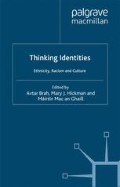Abstract
While I was as intrigued as the next person by the events surrounding Hugh Grant, Divine Brown and Liz Hurley in June 1995, what I became increasingly fascinated by were the ways in which these events were interpreted and (re)presented within the public and media landscape. At the heart of these interpretations/(re)presentations were the racialised notions and constructions of femininity, gender and sexuality. Significantly, this racialisation process occurred not only in terms of Divine Brown’s blackness but equally in terms of Hugh Grant and Liz Hurley’s whiteness. This chapter seeks to explore the social constructions of white and black1 femininities and the relation of these to ideologies of race, national identity and belonging in populist discourse.2
Access this chapter
Tax calculation will be finalised at checkout
Purchases are for personal use only
Preview
Unable to display preview. Download preview PDF.
References
Ahmed, S. (1997) ‘“It’s a sun-tan isn’t it?”: Auto-biography as Identificatory Practice’, in H. Mirza (ed.), British Black Feminism (London: Routledge).
Anthias, F. and Yuval-Davis, N. (1992) Racialised Boundaries: Race, Nation, Colour, Class and the Anti-racist Struggle (London: Routledge).
Brah, A. (1993) ‘“Race” and “Culture” in the Gendering of Labour Markets: South Asian Young Muslim Women and the Labour Market’, New Community, 19(3), pp. 441–58
Brah, A. (1996) Cartographies of Diaspora: Contesting Identities (London: Routledge).
Butler, J. (1993) ‘Endangered/Endangering: Schematic Racism and White Paranoia’, in R. Gooding-Williams (ed.), Reading Rodney King: Reading Urban Uprising (London: Routledge).
Campbell, C. (1995) Race, Myth and the News (London: Sage).
Carby, H. (1982) ‘White Woman Listen! Black Feminism and the Boundaries of Sisterhood’, in CCCS, The Empire Strikes Back (London: Hutchinson).
Cohen, P. and Gardner, C. (eds) (1982) It Ain’t Half Racist Mum (London: Comedia).
Dadzie, S., Bryan, B. and Scafe, S. (1986) Heart of the Race: Black Women’s Lives in Britain (London: Virago).
Davis, A. (1981) Women, Race and Class (London: Women’s Press).
Eisenstein, Z. (1996) Hatreds: Racialised and Sexualised Conflicts in the 21st Century (London: Routledge).
Frankenberg, R. (1993) The Social Construction of Whiteness: White Women, Race Matters (London: Routledge).
Gilroy, P. (1993) Small Acts: Thoughts on the Politics of Black Cultures (London: Serpents Tail).
Hartmann, P. and Husbands, C. (1974) Racism and the Mass Media (London: Davis-Poytner).
Hill-Collins, P. (1990) Black Feminist Thought (London: Hyman).
hooks, b. (1982) Ain’t I a Black Woman (London: Pluto).
hooks, b. (1989) Talking Back: Thinking Feminist, Thinking Black (London: South End Press).
hooks, b. (1994) Outlaw Culture: Resisting Representations (London: Routledge).
Mama, A. (1992) ‘Black Women and the British State: Race, Class and Gender Analysis for the 1990s’, in P. Braham, A. Rattansi and R. Skellington (eds), Racism and Antiracism: Inequalities, Opportunities and Policies (London: Sage).
Mama, A. (1993) ‘Black Women and the Police: a Place Where the Law is Not Upheld’, in W. James and C. Harris (eds), Inside Babylon: The Caribbean Diaspora in Britain (London: Verso).
Mirza, H. (ed.) (1997) British Black Feminism (London: Routledge).
Nkweto Simmonds, F. (1997) ‘My Body, Myself: How does a Black Woman Do Sociology?’, in H. Mirza (ed.), British Black Feminism (London: Routledge).
Parmar, P. (1981) ‘Young Asian Women: a Critique of the Pathological Approach’, Multiracial Education, 9(3), pp. 19–29.
Rich, A. (1979) On Lies, Secrets and Silence: Selected Prose 1966–1978 (New York: Norton).
Rich, A. (1986) Blood, Bread and Poetry: Selected Prose, 1979–1985 (New York: Norton).
Solomos, J. and Back, L. (1996) Racism and Society (London: Macmillan).
van Dijk, T. D. (1991) Racism and the Press (London: Routledge).
Ware, V. (1992) Beyond the Pale: White Women, Racism and History (London: Verso).
Williams, P. (1992) The Alchemy of Race and Rights (London: Virago).
Young, R. (1995) Colonial Desire: Hybridity in Theory, Culture and Race (London: Routledge).
Editor information
Editors and Affiliations
Copyright information
© 1999 British Sociological Association
About this chapter
Cite this chapter
Neal, S. (1999). Populist Configurations of Race and Gender: the Case of Hugh Grant, Liz Hurley and Divine Brown. In: Brah, A., Hickman, M.J., Mac an Ghaill, M. (eds) Thinking Identities. Explorations in Sociology. Palgrave Macmillan, London. https://doi.org/10.1057/9780230375963_5
Download citation
DOI: https://doi.org/10.1057/9780230375963_5
Publisher Name: Palgrave Macmillan, London
Print ISBN: 978-0-333-71774-5
Online ISBN: 978-0-230-37596-3
eBook Packages: Palgrave Social & Cultural Studies CollectionSocial Sciences (R0)

